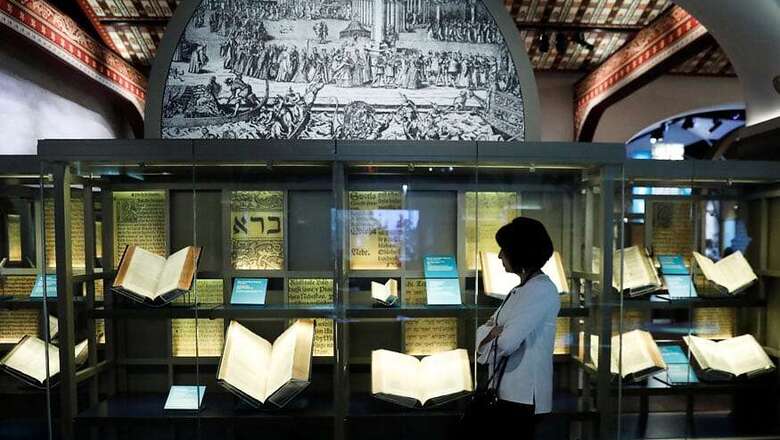
views
Washington: Washington's new Museum of the Bible will take a leap of faith this weekend, opening its massive bronze, Latin-inscribed gates to visitors eager to browse ancient relics and interactive exhibits -- as well as to critics skeptical of the institution's "non-sectarian" mission.
The privately funded $500-million museum tells the story of the Bible by blending archaeology with history and a hint of whimsy, offering everything from antiquities and biblical curio to an amusement ride, all intended to "celebrate" the good book.
But since its genesis the 430,000 square-foot museum has raised eyebrows, as much for its location -- mere blocks from the US Capitol building -- as its creator and major financial backer, billionaire evangelical Christian Steve Green.
Green's Oklahoma City-based arts and crafts retail chain Hobby Lobby burst into the public sphere when it won a 2014 Supreme Court case permitting companies on religious grounds to opt out of contraceptive coverage mandated by an Obama-era health care law.
And just months ago the company came under fire for illegally importing more than 5,500 artifacts, including ancient clay cuneiform tablets that had been smuggled out of Iraq. Attributing the purchase to naivete, Hobby Lobby agreed to forfeit the pieces and pay a $3-million settlement.
The Green family's Christian convictions and the smuggling debacle had skeptics questioning both the museum's ideological aim and the provenance of its antiquities, more than 500 of which are on view on the institution's "history" floor.
But Green, who chairs the museum's board, insists it aims only to "present the facts."
"This is a journalistic view of the Bible. It's not about espousing our faith," he told reporters at a preview ahead of the museum's grand opening.
"We're inviting all people to engage with this book, so we embrace all that will come and celebrate the Bible."
'Not about evangelizing'
Situated just south of Washington's National Mall esplanade that houses the Smithsonian museum complex, the sprawling eight-floor institution -- which includes a ballroom, performing arts hall and biblical garden -- lets visitors tour a theatrical exhibit recreating what Nazareth may have looked like in the time of Jesus.
Another area explains the evolution of the Old Testament, displaying artifacts and manuscripts from the Green family as well as the Israel Antiquities Authority. The museum also shows items on loan from institutions including the British Museum and Paris Louvre.
The "Washington Revelations" theater ride takes museum-goers on a simulation "flight" over the nation's capital, pointing out biblical references throughout the city, while the "impact" floor traces the Bible's societal influence -- particularly stateside -- on politics, education, music, movies and fashion.
A large-scale mural depicts pilgrims reading the Bible to Native Americans, weaves through portraits of suffragists and anti-slavery activists, and ends with an image of Reverend Martin Luther King Jr delivering his "I Have a Dream" speech, which contains a number of biblical references.
Small placards also explain how the Bible was used to justify both sides of the Civil War and opposing views on African-American slavery, as well as the enslavement of Native Americans. The museum does not, however, include references to hot-button topics like abortion or access to contraception.
"We try to avoid anything that's controversial," said Tony Zeiss, the museum's executive director.
"We're not about evangelizing, we're about piquing people's curiosity."
But Candida Moss -- religious scholar at the University of Birmingham and co-author of the book "Bible Nation: The United States of Hobby Lobby" -- says the museum missed a chance to delve into more complex aspects of biblical history.
- 'Rise above' the controversy -
"You can't just tell the story; you're always interpreting," she said. "I think what's really curious is what's not in the Bible Museum."
Moss argues the museum focuses too narrowly on American history, making scant reference to the Mormon branch of Christianity, the Ethiopic Christian Churches, or the Bible's ties to the Quran.
She also voiced concern over the authenticity of a number of the museum's relics, including fragments of the Dead Sea Scrolls, which she said "many scholars believe to be almost entirely forged."
One of the institution's advisors Lawrence Schiffman, a professor of Hebrew and Judaic Studies at New York University, acknowledged the fragments "may or may not be real" -- but said accompanying placards made clear research is underway.
Gordon Campbell, a University of Leicester professor and lead historian at the museum, says he hopes Washington's newest cultural institution will "rise above" the controversy.
"I aspire to make it encourage debate centered on the Bible and not centered on the Greens," he said. "I hope we can succeed."
For museum members Jim King and his wife Pam, a sexagenarian couple from Austin, Texas invited to the previews, the free museum is "world-class" and its location near federal government offices "a very great statement."
"I think it's something that anybody could enjoy," King said, "because of the historical aspects that are involved in it -- as well as the word of God, of course."

















Comments
0 comment